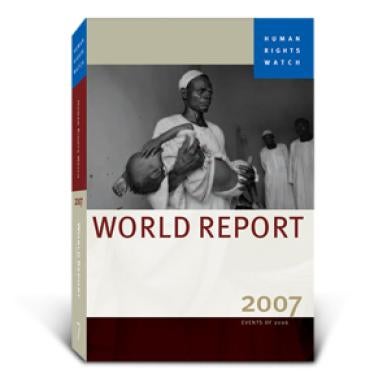(New York) - Burma’s National Convention to write a new constitution would create a more refined but still repressive system of military rule, Human Rights Watch said today. The convention, begun in 1993, resumes today in what the military government has promised as the final step before a referendum to endorse the constitution.
After cancelling the 1990 elections won by Nobel Peace Prize winner Aung San Suu Kyi’s National League for Democracy, the military government began the National Convention to convince Burmese citizens and the international community that it was serious about reform and a return to civilian rule.
But over the past 14 years, the military government has tightly controlled the process by handpicking most of the 1,080 delegates, arresting members of political parties, and enforcing strict rules that limit challenges from or dissent by convention delegates. In 1995, the NLD walked out of the convention, citing unfair working provisions. A year later, the military government passed Law No. 5/96, which makes public criticism of the National Convention a criminal offense.
“The generals who run Burma have trumpeted the convention as a vehicle for a return to civilian rule and the rule of law,” said Brad Adams, Asia director at Human Rights Watch. “But they have engineered the outcome to ensure the military remains in control and excluded the people of Burma from the process.”
The provisions of the constitution already agreed by the ruling State Peace and Development Council (SPDC) include reserving 25 percent of all future parliamentary seats for serving military officers. The constitution would also require that the president have military experience and that serving military officers hold the ministerial portfolios of Defence, Home Affairs and Border Areas Administration. Moreover, it would prohibit spouses of foreign nationals from holding parliamentary seats, a measure intended to bar from office Aung San Suu Kyi (whose husband was British).
The convention will resume in an isolated, purpose-built facility at the camp of Nyaunghnapin in Hwambi Township, north of Rangoon. Delegates are prohibited from speaking with members of the press and are not allowed to make proposals without permission. Many delegates – particularly those from ethnic minorities that have been engaged in armed conflict with the government, such as the Mon, Wa and Kachin – have voiced dissatisfaction with the operating provisions and principles that will entrench the military’s control over a future civilian government.
The latest and perhaps final session of the convention is scheduled to lead to the drafting of a constitution based on the principles agreed by the National Convention. The next step would be a national referendum to endorse the new constitution, followed by the holding of what the military government calls “free and fair elections” for a future People’s Assembly. All of this would create what the military calls a “disciplined democratic system.”
“Delegates who are critical of the process face an invidious choice. Either they can keep silent in hope of gaining some positive results for their communities, or stay out of the process and get nothing,” said Adams. “This is not ‘disciplined democracy’ as the military terms it, but continuing repression by generals who refuse to allow Burmese to decide their own future.”
Many in Burma believe that the future constitution has already been written and that the National Convention is window-dressing to avert public protests. There are also concerns that the entire process may be part of preparations to transfer power to the Union Solidarity and Development Association (USDA), a military-created “social welfare” movement with 23 million members, many of whom are civil servants, teachers and students coerced into joining.
Some members of the USDA have been involved in attacks on grassroots human rights defenders and opposition political figures, including against Aung San Suu Kyi. The USDA has the same aims and political objectives as the military. Its large and increasing administrative, economic and coercive power throughout Burma since 1993 has made it the likely candidate as the appointed civilian face of future military rule.
“India, China and Russia have looked the other way as Burma’s military government tries to hide its repressive rule behind a facade of constitutional rule,” said Adams. “The United Nations and key members of the international community should make it clear to the SPDC that they will not recognize the outcome unless this constitutional convention adequately and freely reflects the views of all segments of Burmese society.”







